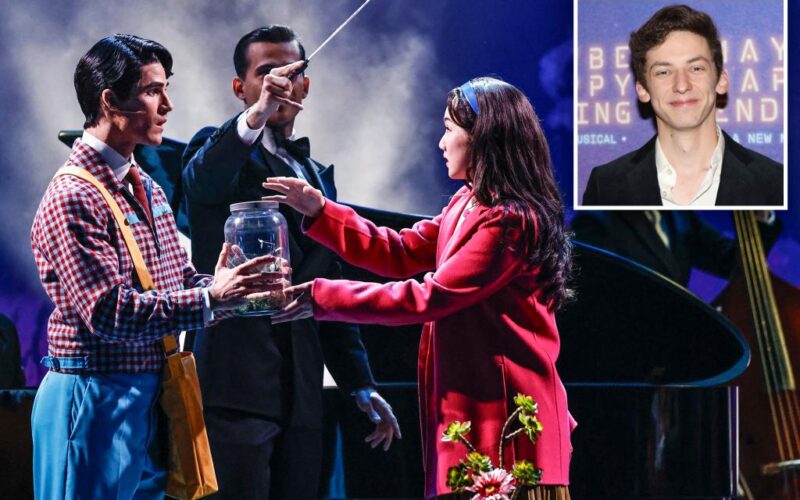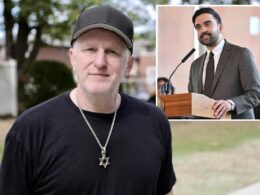Broadway has enjoyed a quiet, relaxing and peaceful summer.
But show people can’t have that!
They always need, as Betty sang in the recently shuttered “Boop! The Musical,” something to shout about.
And their something has finally arrived in the form of a piping hot controversy at this year’s Best Musical Tony Award winner, “Maybe Happy Ending.”
It’s a doozy.
Some members of the theater industry are hollerin’ “It’s a scandal! It’s a outrage!” over the race of an actor who’s been cast to play — believe it or not — a robot.
“Maybe Happy Ending,” by the writing team of Hue Park and Will Aronson, is a sweet little science-fiction romantic-comedy that’s set in Seoul, South Korea, during the year 2060.
The main characters are Oliver and Claire, played by Darren Criss, who’s half Filipino, and Helen J. Shen, who’s Chinese.
Oliver and Claire are robots.
But the nuts-and-bolts duo have become defunct, so they embark on a quirky adventure to find Oliver’s old owner.
It’s perhaps the nicest show to ever come to Broadway.
Or it was. Until this latest fracas.
The happiness dimmed when the wonderful, Tony-winning Criss’s replacement was announced: actor Andrew Barth Feldman, the fantastic “No Hard Feelings” star who’s also Shen’s boyfriend. He’s white.
Uh oh!
In private, many on Broadway are largely OK with that. The most common refrain I’ve heard is: “Well, they’re robots.”
But social media, as it does best, has poured gas on the fire.
Playwright and actor BD Wong, who was a strong voice in 1991 against British actor Jonathan Pryce playing the Eurasian Engineer in “Miss Saigon” (Wong was absolutely right about that), wrote an essay slamming the choice.
And the Asian American Performers Action Coalition came out against it, too.
What do the creators have to say?
They didn’t write the roles to be culturally specific.
Because they’re robots!
Robots don’t have a culture.
Well, except the Terminator, of course. He loves schnitzel and strudel.
After the backlash, Aronson and Hue — kind and humble as it gets — explained on Instagram that they set out to create “a modern ‘Fantasticks,’ able to be comfortably performed by anyone, anywhere — yet distinctly set in Korea.”
Fair enough.
Oliver and Claire, they said, are “products created by a global company” who are “ethnically undefined.”
That makes a lot of sense. Because the characters are robots.
The production said in a statement to the Times, “We are proud to have created a show where every role can authentically be portrayed by an Asian actor, although the roles of the robots were not envisioned to always be cast that way.”
And that openness has been true throughout the “Maybe Happy Ending” journey.
Aronson told the LA Times back in March that during an early workshop, the parts were taken on by Denée Benton, who’s black, and Corey Cott, who’s white.
See? There’s lots of flexibility when casting robots.
Look, it’s Hue and Aronson’s show. They wrote it. Who’s to tell them what they can and cannot do and what their intentions were?
The fact is “Maybe Happy Ending” is the only Broadway musical I am aware of in which the leads are made of metal. (Although I’ve seen plenty of shows where it sure seemed like they were). It’s an extremely unusual circumstance, and hardly one to draw broad conclusions from.
In works about Asian humans, like the Imelda Marcos musical “Here Lies Love,” something like this would never happen anymore.
Feldman, who was nothing short of sublime in last season’s “We Had A World,” starts performing at the Belasco Theatre on Sept. 2.
The uproar should die down well before that.
And then fall on Broadway can resume being “Happy.”








